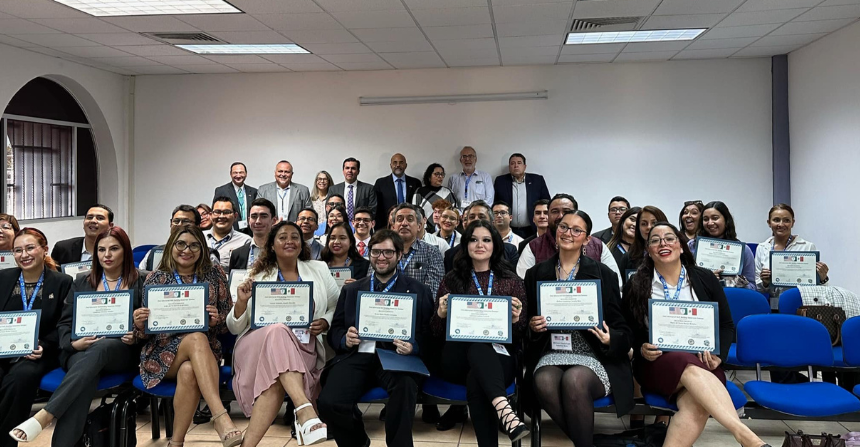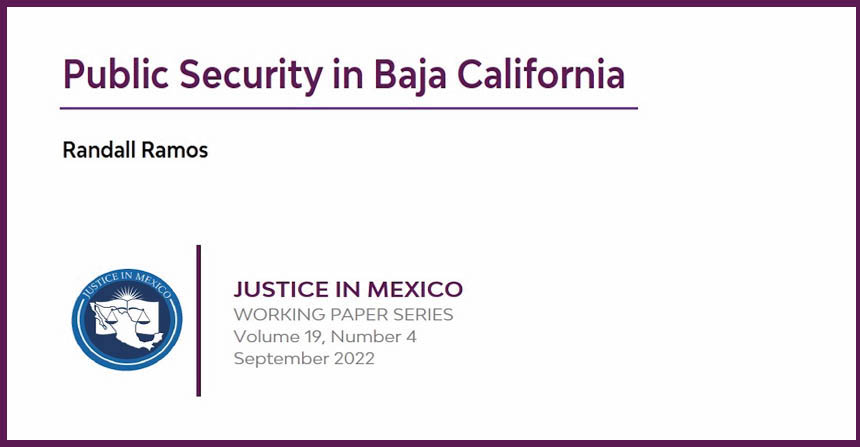05/31/11 — The Trans-Border Institute’s Justice in Mexico Project announced the results of its most recent study of professionals in Mexico’s criminal justice system. Justiciabarómetro’s judicial survey summarizes the findings from a poll of 276 judges, prosecutors, and public defenders in nine different Mexican states.
The study and is now available online at the Justice in Mexico Project site, and provides unprecedented insights on the profile and opinions of judges and lawyers working in the Mexican criminal justice system. The survey is timely in that Mexico is currently working to modernize its judicial sector through a series of reforms introduced in 2008 and scheduled for completion by 2016.
Respondents from nine states were included in the survey: Baja California, Coahuila, Chihuahua, Jalisco, Michoacán, Nuevo León, Oaxaca, Yucatán, and Zacatecas. The survey includes a variety of questions on demographic characteristics, professional profile, perceptions of judicial system functioning, perceptions of lawfulness, corruption, due process and the criminal justice reform of 2008. The survey was conducted through the professional polling firm Data y Opinión Pública y Mercados (DATA-OPM), which made over 2,800 telephone calls made from October to December to the 1,098 sitting judges, prosecutors, and public defenders identified in all nine states, achieving an overall response rate of 276 completed interviews (22.4%).
The report provides a first look at the findings, which identify a substantial need and potential for improvement in the administration of justice in Mexico. Among concerns identified by participants’ responses are problems of workload and capacity, a disparity of opinions among professions on the efficiency of court procedures in criminal cases, and problems of adherence to due process. These findings provide useful indicators for evaluating the performance of Mexico’s criminal justice system and provide a baseline for benchmarking the future progress of the 2008 judicial reform, which introduces major changes to criminal procedure that have generated some concerns in the legal community.
Among this study’s findings, 36% of respondents asserted that there has been a deliberate campaign to discredit the country’s traditional system, and nearly 40% of respondents viewed the 2008 reform as the result of foreign pressure. Even so, more than 80% held generally positive views of the reform, and 76% preferred moving from Mexico’s traditional system to new “oral trials.” Only 47% of respondents believe that the reform will help to reduce criminality, but the vast majority believes that the reforms will speed up criminal proceedings (70%) and reduce corruption in the judicial sector (84%).
The report was authored by Matthew C. Ingram, Octavio Rodríguez Ferreira, and David A. Shirk, and was made possible through the financial support of both The William and Flora Hewlett Foundation and The Tinker Foundation. The authors argue that their findings provide support for cautious optimism about the prospects for judicial reform in Mexico, and help to identify trouble spots that must be considered during implementation over the next four years.
SOURCE
http://justiceinmexico.org/resources-2/justiciabarometro/judicial-survey/





See also “Assessing Judicial Reform in Mexico,” a shorter version of this study which summarizes respondants’ attitudes regarding the workings of the Mexican criminal justice system, as well as the sweeping judicial reforms approved by Mexico’s Congress in 2008. The report finds that general support for the traditional Mexican legal system remains strong, and there is significant skepticism about recent judicial reforms. Despite the concerns the report finds that the provisions included in the 2008 reforms —introducing oral, adversarial criminal procedures— are generally well regarded, particularly in states where they have not yet taken effect. Many respondents are optimistic that these reforms will ultimately help to improve efficiency and reduce corruption in the judicial system. http://justiceinmexico.files.wordpress.com/2010/07/110603-ingrodshi.pdf